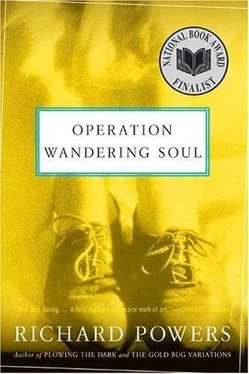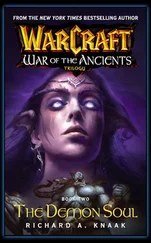Richard Powers - Operation Wandering Soul
Здесь есть возможность читать онлайн «Richard Powers - Operation Wandering Soul» весь текст электронной книги совершенно бесплатно (целиком полную версию без сокращений). В некоторых случаях можно слушать аудио, скачать через торрент в формате fb2 и присутствует краткое содержание. Год выпуска: 2002, Издательство: Harper Perennial, Жанр: Современная проза, на английском языке. Описание произведения, (предисловие) а так же отзывы посетителей доступны на портале библиотеки ЛибКат.
- Название:Operation Wandering Soul
- Автор:
- Издательство:Harper Perennial
- Жанр:
- Год:2002
- ISBN:нет данных
- Рейтинг книги:5 / 5. Голосов: 1
-
Избранное:Добавить в избранное
- Отзывы:
-
Ваша оценка:
- 100
- 1
- 2
- 3
- 4
- 5
Operation Wandering Soul: краткое содержание, описание и аннотация
Предлагаем к чтению аннотацию, описание, краткое содержание или предисловие (зависит от того, что написал сам автор книги «Operation Wandering Soul»). Если вы не нашли необходимую информацию о книге — напишите в комментариях, мы постараемся отыскать её.
Operation Wandering Soul — читать онлайн бесплатно полную книгу (весь текст) целиком
Ниже представлен текст книги, разбитый по страницам. Система сохранения места последней прочитанной страницы, позволяет с удобством читать онлайн бесплатно книгу «Operation Wandering Soul», без необходимости каждый раз заново искать на чём Вы остановились. Поставьте закладку, и сможете в любой момент перейти на страницу, на которой закончили чтение.
Интервал:
Закладка:
"How so?" Kraft asks, finding the words without pause. "What is good?"
"It's good that you come from somewhere else. Like us, only, maybe you stayed dry during the voyage? Maybe you made it over in one hop?" His epithelial folds glint at Kraft; the relatively favored are always fair game. Kraft wonders how old the man is. Granted, he has this twelve-year-old kid. But he is a hundred and forty-four at the youngest.
He should correct the man. He should announce: I'm not from somewhere else. I come from here. Only I left at an early age. Then came back, then left, then… He would explain, only the chronology eludes him, and he cannot say exactly where he is from.
Wisat, oblivious, elaborates. "The trouble with Americans is they think everything begins and ends here, this time. No return, no earth. Imagine: no ancestors! How can one live? It must be terrible. Even their smallest action dies right after the deed is done!"
"A nation of oversteerers," Kraft mumbles in English. The phrase would not translate, even if he had the words. It is intelligible only to those with no beginnings or ends but their own. No time around but this one.
Wisat declares that no one who thinks deeds are their own consequences should be allowed to saw into the spirit house of another's marrow. They should be outlawed from healing, not so much for the sake of the patient's karma as for the surgeon's.
Kraft drifts from the argument. Just the perfume in these clipped syllables returns him to a moment when each sound and scent queue-ing for experience, when all the sensory boutique whispered of pre-knowledge, when the new seemed full of nearby, culminating explanation. First etudes, Handel or Haydn, the Hagia Sophia, jasmine, burned peanuts, gong wong yai, black-market currency exchanges, handworked bullwhips, iguanodon skeletons, a swing south: these, the multiplicity, the range, surrendered to culpable adulthood. Faintly familiar already, nodes on the scheme of things already inside you. Now they are back, insisting you've been here before, calling out both question and command: Remember? Remember. Little one, have you ever seen an elephant?
Commotion calls Kraft back, a noise in the street. A ghetto-blasted popping sound issues over the crunching glass, the assorted squeal-ings, the general yell of background noise. Even before its envelope parts from the white sound waterfall, every dog within a two-mile perimeter of Carver begins baying. Exactly why the grunts used to slip in and poison these beasts in advance.
Crazed cacophony, but quotidian enough that Kraft would not even cringe except for what happens to the girl. Violently, she repeats her stage swan dive. As the trigger sound becomes audible to humans, a quick-quick-quick scimitar subdividing the aqueous air, she throws herself at her father, shouting a single word, the surname of dread.
Her movement is more astonishing given that, below the waist, she is little more than two moist streamers of crepe paper. She reverts in fear to her native tongue. Wisat must translate now, baring his remaining teeth in parental embarrassment.
"Dragonflies."
Kraft hears it home in, a small rotor-blade flotilla, Plummer on the helplessly receiving end. Then it hits him: How old is this bean sprout? He checks the chart, verifies that she was not even born until years after the last Huey was swept from the continent's edge. Even granting that her war was the lingering one, dragging on in unpublished secret, beyond the limits of American attention span: Dragonflies? If the gunships were even around past the child's birth, who was flying and maintaining them? And to what ends, in that pathetic, valueless valley, except to drive out this old medicine man, annul his wife, excise all his offspring but the one remaining infant, and scar this one permanently with a monstrous metal mother's quick-quick call, a Lorenzian imprint gone mad?
That question sets off a dozen others in Kraft's head, questions that should have occurred to him long before. How did these two reach here anyway, rural refuges of permanent war? How could they have gotten out, met the exit fees? Whom could they have paid? They had no possible means of escape. Therefore, Kraft concludes, they cannot possibly be here.
The girl cowers from a conditioning she could not have picked up firsthand. Acquired chopper terror, learned from old footage, her father's accounts, or daily proximity to heavenly herbicide recipients. There are enough of them, in this city filled with escapees from all the burning jungles this city has torched. She lives alongside Hmong who cannot lift a fork without family consultation. She goes to school with the grandchildren of Nisei internees. She eats with Asians who have never seen real peppers. She studies with Asians who cannot find China in an encyclopedia. She plays with the children of potassium flashes, several hundred thousand let in over a few-year span. Half-children of fathers who thought they'd never be found. Mothers who never stopped searching. Asians who blew free of their necropolis home, smuggled out for the market's going fee or shipped to Oahu and Guam in empty American caskets, surviving by impersonating death. Asians who came here long before the first European, before the invention of the word "Asia." Asians who will never have the slightest grasp on what passes for sanity here on this side of the rim. She might have contracted the sky-burn terror from any one of them. Kraft looks away from her panicked embrace, so as not to humiliate the child even more. He picks up the top book on her study stack, placed conspicuously for his benefit over the Let's Learn About Stars and Planets! and the Electricity and You. A slender pastel paperback called Through the Looking Glass: it takes him until the invocation to remember that he bought it for her, in a luckless attempt to get the girl to read beneath her level, below herself.
Child of the pure, unclouded brow
And dreaming eyes of wonder!
Though time be fleet, and I and thou
Are half a life asunder,
Thy lowing smile will surely hail
The love-gift of a fairy tale.
It takes him until sestet's end to remember the place he bought it, the city, the day, the woman he was with, the woman's name, why he has avoided her. Too close for memory. Memory lies half a life asunder now, in Krung Thep, that other City of Angels where he was the resident immigrant.
A gnarled hand grips his, covers it as it flips pages. Wisat, pointing to the slight volume, chuckles. Addressing fatfarang in the old imperial language of occupation, he says, "Vous etes un bon homme."
Kraft looks up. The girl is back, hiding her sheepish face. In the five tones, the most musical language ever invented to say human things, Kraft sings to her, "We're going to have to take your whole leg off. And it may not be enough."
Father and daughter look surprised that he makes the pronouncement public. They give him the look of the medically indigent, the look of those who know wider beginnings and ends.
Wisat asks Joy something in an undertone Kraft cannot catch. The girl fishes about in her school supplies bag, emblazoned this year with Japanese crime-fighting robots that change into F-15s. The satchel is full of flat-ended number twos, edible paste, and carefully preserved if worthlessly smushy steel protractors. She extracts a flash of silver that she passes to her dad.
He in turn hands it to Kraft with the verbal gift-giving formula of a land belonging to neither of them. Kraft takes the present, mumbling the thank-you phrase once second nature, yet never his. At first, he mistakes the gift for a small Buddha. It is, in fact, a metal, Western-winged trinket.
"What is this?" he asks, his skin going voltaic.
Читать дальшеИнтервал:
Закладка:
Похожие книги на «Operation Wandering Soul»
Представляем Вашему вниманию похожие книги на «Operation Wandering Soul» списком для выбора. Мы отобрали схожую по названию и смыслу литературу в надежде предоставить читателям больше вариантов отыскать новые, интересные, ещё непрочитанные произведения.
Обсуждение, отзывы о книге «Operation Wandering Soul» и просто собственные мнения читателей. Оставьте ваши комментарии, напишите, что Вы думаете о произведении, его смысле или главных героях. Укажите что конкретно понравилось, а что нет, и почему Вы так считаете.












